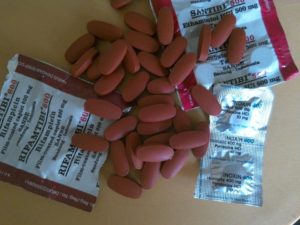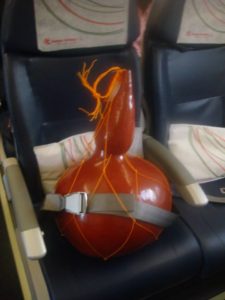Souvenirs

He who is sick will not refuse medicine ~
Nigerian proverb
I like to collect obscure things when we travel. My calabash, a drinking utensil bought in Rwanda, travelled back with me on the plane to Kenya, via Burundi.
What do you collect when you travel?
A souvenir is something to remember a place we have travelled to. Some people collect t’ shirts or baseball caps. Others go for magnets or key-chains (though of course, most are made in China and not the place you have just travelled to).
Me, I seem to collect health horror stories from tropical climes.
My diseases, bites and infections date back to our time in Zambia. We had been instructed about Malaria precautions before we went.
The NGO that we worked for, shared with us the story of a volunteer who had died from cerebral malaria in Burundi the previous year. It was scary stuff. We faced being sent home if we didn’t commit to the prophylaxis.
So we chocked and gagged and swallowed the bitter pills in hope. We slept under a net. I applied repellent frequently.
The mosquitoes were silent and deadly.
One pill was taken daily. Another, weekly. I got malaria anyway.
That first time with malaria, my husband described me as ‘like a radiator’. He knew I was really sick when I could not talk! I was beyond depleted. The parasites get into your blood and it attacks your whole system.
Five months later I got a second dose.
In between the two malaria episodes, I was adopted by a Putse fly. These insects lay their eggs in your wet laundry, so all clothes need to be thoroughly ironed to kill it all off.
I don’t like ironing.
The ‘thing’ embedded itself into the skin on my back. For a day or two I felt something, some weird discomfort. Then, in the bath I picked at it, and to my horror, wriggling larvae emerged under my long, finger nail.
Ghastly!
In the UAE I steered well clear of both camel spiders and scorpions. In Kenya I was not so lucky. One gorgeous sunny afternoon in Nairobi, I lazed under a banana tree in a camp chair. All was perfect until the bite, a tropical spider bite.
I ended up in a Nairobi hospital on a drip and getting a Cortisone shot. I was discharged with a further week’s worth of antihistamine and told to stay away from banana trees, where a particular type of spider likes to hang out.
In Ethiopia my collectible was a worm. On a trip with students, they were in charge of the budget, which meant that they had to plan and cater for the group. On our last night in the Ethiopian highlands, they wanted chips (French fries). They had potatoes but no oil. They sourced some fat from somewhere and made some potato wedges fried in ‘fresh farm butter’. It was not so fresh.
I was really sick, really quickly.
Back in Dubai I was wrongly diagnosed with giardia. The treatment did nothing.
Several further tests were done. I continued eating whatever I liked, as weight was falling off me, while my new friend was enjoying all the nutrition from my diet.
I was tired. I was fed up. It was eventually confirmed that I had a worm in my body and I was treated.
Some travellers have similar stories of other parasites that their bodies host for many months till detected.
My most recent lurg reared its ugly head over a year ago. It started with a strange lump in my neck. After blood tests, X rays and a biopsy I was diagnosed with latent TB.
Tuberculosis (TB) is a disease caused by the tubercle bacillus bacteria. It is a serious disease which affects many countries, particularly ones in the developing world. The Bill and Melinda Gates foundation states that “TB remains the leading cause of death from infectious disease worldwide. In 2016, an estimated 10.4 million new cases were reported, and nearly 1.7 million people died from the disease”
TB statistics are reported by countries to the WHO. There is a list of 22 countries that are known as ‘high burden’ countries. My doctor told me that Indonesia is on this list and that the country has a high prevalence of TB.
Someone with active TB can transmit the germs through the air. Somewhere, in a market, in a taxi, who knows where, someone coughed and I breathed in their germs.
For most people, their immune system will fight this. I was very unlucky. Soon after moving to Indonesia I had suffered a head injury. There had been a lot of travel, anxiety and exhaustion. And it took its toll with my health.
Latent TB is apparently notoriously difficult to treat. A friend described it as “like having a volcano in your body”. It’s there, it’s dormant but if allowed, it could erupt. It had to be treated.
So, over 12 months I took countless tablets. The hospital conducted 13 USGS, one to diagnose and one each month afterwards to monitor the infection reducing.
As the meds were strong, I had several blood tests, checking for damage to the liver. I was advised not to consume alcohol because of the risk. That meant no drink for one year.
One whole year!
There were X rays to ensure that the TB was not in my lungs. My eyes were tested too, as blurred vision is a side effect of one of the drugs.
This was not a journey I had chosen in the tropics.
So that’s my full collection of health horror stories. Fridge magnets would have been easier!
I have an assortment of Christmas tree decorations from different places we have lived. Perhaps I will focus on that in the future.
Do you have any health horror stories from your travels?
What do you collect when you travel?

© Maggie M / Mother City Time
Wow what a story ! Luckly I didn’t bring any tropical illnesses from my travels so far. You didn’t sell Africa to me well 🙂
I collect postcards. I got my very first postcard about 25 years go. They might turn into a nice wallpaper one day 🙂
Hi Anna. The horror stories span almost 20 years of travel. That’s like one episode every 4 years! I can laugh about it now. And we knew full well the risks we were taking in many developing countries. Honestly, I wouldn’t be without the years of living in other places. ‘Toe-dipping’ on a two or three week trip was never going to work for us. We want to live in a place, to be immersed in it and learn. My husband got seriously ill from a ‘cafe con leche’ bought in a railway station in Madrid. We called it ‘Cafe con death’! He couldn’t leave the (awful) railway hotel for three days! And then you look at something like Giardia. It’s super common in the USA apparently (in fast food). As for Africa, ‘the luminous continent’, we have a hundred brilliant stories, for every one of those health horror stories. Hope you collect many more postcards and memories. Thanks for your comment, Anna.